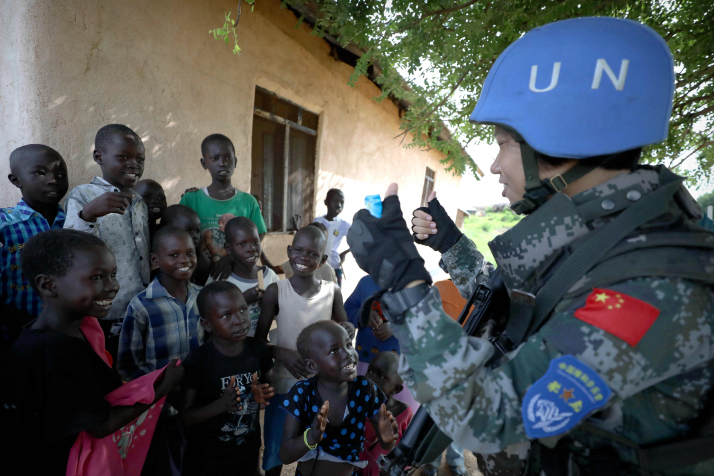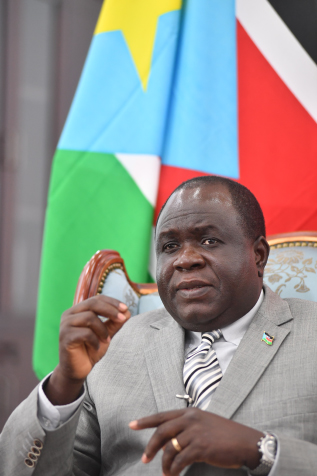|
||||||||||
| Home Nation World Business Opinion Lifestyle ChinAfrica Multimedia Columnists Documents Special Reports |
|
||||||||||
| Home Nation World Business Opinion Lifestyle ChinAfrica Multimedia Columnists Documents Special Reports |
| ChinAfrica |
| Young but Solid Partnership |
| China-South Sudan relations have much room for optimism |
| ChinAfrica | VOL.11 July ·2019-07-15 |

Yu Peijie (right) Chinese woman peacekeeping soldier in South Sudan, with students in a primary school in Juba on April 30, 2018 (WANG TENG)
As the youngest country in Africa, South Sudan has developed ambitious plans to attract foreign investment in a bid to maintain sustainable development and improve the lives of its people. Despite the landlocked country in East Africa having abundant resources that include energy, minerals and agriculture, it is still one of the least developed countries in the world.
ChinAfrica magazine spoke to South Sudanese Ambassador to China John Andruga Duku on May 29 to learn more about the country's future development plans and its relationship with China. An edited excerpt of the interview follows:
ChinAfrica: This year marks the eighth anniversary of the establishment of China-South Sudan diplomatic ties. How has the bilateral relationship fared in this time?
John Andruga Duku: We, as the Republic of South Sudan, have special relations with the People's Republic of China. China is a strategic partner for South Sudan. As you rightly put it, we are marking the eighth year of our diplomatic relationship with China this year. It is very important for the Chinese people to know that South Sudan see China as a friend, since China established diplomatic relations with South Sudan the same day our country declared independent.
South Sudan is committed to work with our colleagues in African countries to advance common African interests with China as we marked the 56th anniversary of the establishment of the Organization of African Unity (predecessor of the African Union) on May 25. We have to evaluate relationships between Africa and China. We, as Africa, have positive relations with China on different levels, bilaterally, as a member state of our regional organization the African Union, through the Forum on China-Africa Cooperation (FOCAC), and within the context of the Belt and Road Initiative. In all those areas, South Sudan is a fully committed participant and we see our relationship blooming on the win-win basis as Chinese President Xi Jinping said.

John Andruga Duku (WEI YAO)
South Sudan is the world's youngest country. What is the most important issue in your country's future development?
We are a country floating on a wealth of oil resources, but this oil is under developed. South Sudan needs to engage with China in its bilateral relationship to benefit from its technology. We need to increase oil production so that the oil revenue can be used to literally increase farming.
We see agriculture as the future of South Sudan, not oil. Agriculture cannot prosper without roads. We must invest in infrastructure. We want to use China's technology in our oil sector so we can use the oil revenue to build these roads. We want to be the food basket of Africa because we have vast Agricultural land.
Of the vast area, 75 percent is not occupied, so we can use that for mechanized farming. We need Chinese investors in areas like organic farming to produce soya beans. I want to take this opportunity to announce to the businessmen and investors in China that South Sudan is open for investment in agriculture and specifically the staple food of China that is soya bean for making tofu.
In which sectors do you think South Sudan and China need to strengthen cooperation?
First of all, we want to strengthen our cooperation in building the economy of the two countries. China has advanced technology as I said previously. Their booming economy can benefit us and the rest of Africa. Infrastructure is vital to us because we are starting from zero. We have no roads, railways or airports of international standard. We also have to improve river transport between South Sudan and Sudan.
Besides, political cooperation is already happening between the two governments. We work with China in many aspects. Within Africa, we have the mechanism of FOCAC, as well as the Belt and Road Initiative. We are looking forward to the First China-Africa Economic and Trade Expo to be held in Changsha [in Hunan Province] where South Sudan will be represented. These are areas where we see our cooperation moving forward. Our intentions here are to build strong relations with China. We take the message of President Xi seriously. When he said we want to build a community of shared future on the win-win basis, as Ambassador in China, I must interpret the meaning of this to my government.
My understanding of win-win basis is that China has got something it can contribute to Africa and we as Africa have got something we can share with China. Now, what is it we are sharing? South Sudan is the country with the most cattle in Africa, but it is not used for economic value. We have lots of goats and sheep as well and these are all opportunities. We are inviting Chinese investors to come and taste our unique beef grown through organic farming. So these are the areas I see cooperation moving forward.
How can the Belt and Road Initiative better align with your country's development strategy?
For Africans and as South Sudanese, there are a lot of competing interests in the Belt and Road Initiative. To have a portion of the Belt and Road Initiative cake, we must align our priorities with the Belt and Road Initiative. Infrastructure and food security are two areas which are very important in South Sudan-China cooperation under the framework of the Belt and Road Initiative. Food security provides stability, and infrastructure and gives opportunity for people to move around.
We need help in bringing technology and realizing food security. We also need help to improve our education and health systems. We are not saying all this should be done by Chinese concessionary loans or grants, but we are putting on the table crude oil for development. Using crude oil for development is a concept introduced by South Sudan President Salva Kiir Mayardit.
China contributes to a police contingent under the UN peacekeeping framework in South Sudan. How have these personnel performed in terms of maintaining peace and stability in South Sudan?
One of the biggest contingents of the Chinese contribution to the United Nations peacekeeping efforts is in South Sudan. Before I took this assignment as ambassador here, I was the director in charge of the United Nations agencies in Juba, so I know this issue very well. The contingents of Chinese peacekeepers, both police and the army, are playing a big role in South Sudan and have made a difference in terms of stabilization in the country.
We are grateful. I take this opportunity to offer my sincere condolences to the people of China and the government of China for the tragedy which happened in 2017, where Chinese peacekeepers lost their lives. We want China to continue to remain engaged. China is the only member of the five permanent members of the Security Council of the UN that have endorsed the current agreement in South Sudan. This also demonstrates China's commitment and friendship. On behalf of my president and people of South Sudan, I want to thank the People's Republic of China for endorsing the peace process in South Sudan.
| About Us | Contact Us | Advertise with Us | Subscribe |
| Copyright Beijing Review All rights reserved 京ICP备08005356号-5 京公网安备110102005860号 |